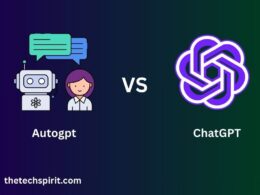Should I Study Artificial Intelligence, (AI) is one of the most exciting and rapidly-growing technological fields today. An AI degree can open up many career opportunities, but studying AI also requires significant commitment.
If you are considering an AI major, here are some key factors to weigh as you make your decision.
Table of Contents
What is Artificial Intelligence?
To determine if an AI degree is right for you, it helps to understand what exactly artificial intelligence is and isn’t.
Definition of AI
Artificial intelligence refers to computer systems or machines that are designed to mimic human intelligence and perform tasks that would otherwise require human cognition.
AI involves programming computers to carry out tasks that normally require human intelligence, such as visual perception, speech recognition, and decision-making.
Examples of AI Technology
Some examples of artificial intelligence that we encounter in everyday life include:
- Virtual assistants like Siri, Alexa, and Google Assistant
- Recommendation engines used by Netflix and Amazon
- Self-driving car technology
- Fraud detection in banking
- Image recognition used in photo tagging
These examples demonstrate that AI is being applied across many industries today. However, experts believe AI capabilities will grow exponentially in the coming decades.
Applications and Future of AI
When considering an AI major, it helps to understand the current and potential applications of this technology.

Current Applications of AI
The consumer examples above, artificial intelligence is already utilized in many industries:
- Precision agriculture uses AI for tasks like crop and soil monitoring.
- Healthcare leverages AI for drug development, clinical diagnostics, and personalized medicine.
- Financial services employ AI algorithms for insurance underwriting, stock trading, and personalized recommendations.
- Manufacturing integrates AI for optimizing supply chains, predictive maintenance, and automating processes.
Future Potential of AI
The future possibilities of AI are vast. Here are just a few examples of how artificial intelligence could transform our world:
- Autonomous cars and trucks could revolutionize transportation.
- AI medical assistants could provide improved healthcare access.
- AI automation could free up human time and labor.
- AI could help generate clean energy solutions and optimize infrastructure.
- AI agents could provide customized education for students.
Given these endless possibilities, AI skills will be in high demand across industries.
Reasons to Study AI: Should I Study Artificial Intelligence
Beyond the applied uses of AI, there are several compelling reasons to pursue an artificial intelligence degree.
Career Opportunities
According to a report from Indeed.com, demand for AI talent on the job site grew by 485% between 2015 and 2018. Some career paths an AI degree could open up include:
- AI Engineer – Developing AI algorithms and systems.
- Machine Learning Engineer – Applying algorithms that allow software to improve with data.
- AI Researcher – Advancing innovations in neural networks, robotics, and other AI fields.
- Data Scientist – Uncovering insights from data using statistics and programming.
- AI Ethicist – Ensuring AI systems are aligned with ethical standards.
High Demand and Salaries
The job growth estimates for AI-related roles are staggering. The number of active AI startups has also grown 14x since 2000.
Graduates with AI skills are well-positioned for these abundant opportunities. Salaries for AI-related jobs typically start above $100,000.
Interesting and Cutting-Edge Field
In addition to great career prospects, AI is simply a fascinating field to study. The techniques used in AI, like machine learning and neural networks, allow computers to solve problems in creative ways.
AI offers the chance to be on the cutting edge of technological advancement.
Challenges of Studying AI
While an AI degree offers immense benefits, the field also comes with its difficulties. Being aware of these challenges can help you prepare.
Difficult Concepts and Math Requirements
AI involves complex computer science disciplines like data structures, algorithms, and machine learning. Fluency in math (calculus, probability, linear algebra) is essential. Students without strong math abilities may find the conceptual aspects of AI quite difficult.
Requires Commitment and Hard Work
Like any advanced technical field, an AI degree demands time investment and hard work. Many students are not prepared for the rigorous math requirements. Completing projects, labs, and other hands-on work is also time-intensive.
Potential Ethical Issues
As AI capabilities grow, ethicists have raised concerns about issues like bias in algorithms, data privacy, and job automation. AI students should be prepared to grapple with how to advance AI responsibly.
How to Prepare for an AI Degree
If you are excited by the possibilities of AI, there are steps you can take early on to prepare:
Take Relevant High School Courses
Explore course options like computer science, programming, calculus, statistics, and logic to build relevant foundations. AP computer science courses can also give you a head start.
Learn Programming Languages
Python and R are heavily used in AI programming. Learning the basics before college will help you hit the ground running in AI coursework. Many free online courses are available.
Consider Math Tutoring
If math is not your strong suit, invest in a tutor. Getting comfortable with high school math concepts will make absorbing higher-level college math much easier.
Finding the Right AI Program
Once ready to apply for colleges, look for the following indicators of a quality AI program:

Research Universities and Accreditation
Look for AI degrees from accredited universities, especially those with established technology and engineering programs. Larger research universities tend to have more AI course offerings.
Look for Hands-On Learning and Research
AI is an applied science. Look for programs that offer opportunities like capstone projects, coding labs, data analysis applications, and access to real-world datasets. Programs with AI research institutes are a plus.
Consider Specializations and Joint Majors
Many schools offer AI degrees with specializations in areas like machine learning, robotics, natural language processing, etc. Joint majors like AI + Business, AI + Design, or AI + Healthcare are another option.
Conclusion
Studying artificial intelligence introduces students to one of the most transformative and in-demand technologies of our time. An AI degree opens doors to abundant career opportunities and the chance to advance leading-edge innovations. The field does require strong math abilities, coding skills, and a commitment to hard work.
By considering the pros and cons, and following the steps to prepare, you can determine if a future in artificial intelligence is the right choice for you.
FAQs
What kind of salary can I expect with an AI degree?
According to Glassdoor, the average base salary for an AI engineer is around $146,000 in the US. Other AI roles like research scientists, machine learning engineers, and data scientists similarly report six-figure earning potential.
Do I need to be good at math to study AI?
Yes, math abilities are crucial for success in an AI program. Courses cover topics like probabilities, algorithms, calculus, linear algebra, and statistics. Building strong math skills in high school is the best preparation.
Is an AI degree expensive?
AI degrees are offered at both public and private universities. Public university programs in your state may offer more affordable in-state tuition options. Scholarships, grants, work-study jobs, and financial aid can also help reduce costs.
What programming languages should I learn for AI?
Python and R are the most common languages used in artificial intelligence programming. MATLAB, Java, C++, and Lisp may also be used in some programs. Learning Python basics before starting an AI program is recommended.
Can I study AI online?
Some universities offer online bachelor’s degrees in AI fields like machine learning and data science. This allows students to study AI remotely. However, hands-on learning opportunities may be more limited than in on-campus programs.










trgregrgtg